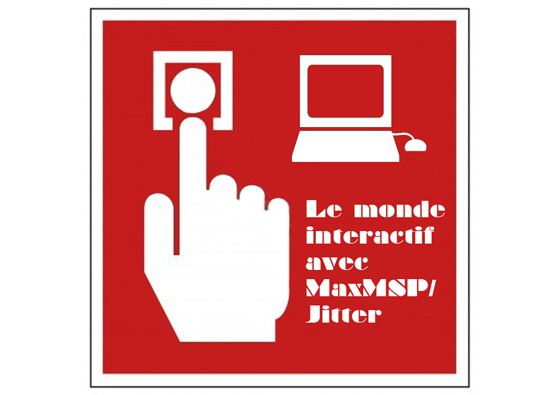Philippe Hughes The Interactive World of MaxMSP/Jitter

P. Hughes, 2013
Workshop May 18-19, 25-26 and June 8-9, 2013 from 12 pm to 5 pm
This workshop is specifically designed for visual artists and musicians wanting to learn how to use computers for interactive projects, or physical computing to build their own instruments. Covering the basics in electronic components & circuits typically used in DIY art projects, and introducing a few useful languages (MaxMSP/Jitter and C for Arduino), each workshop session will provide an opportunity for participants to get some hands-on practice through small interactive projects.
*The workshop will be given in French by a bilingual instructor.
PROGRAM
Max
- Taking the “artist’s fear of computer programming” away by demystifying what MaxMSP is and isn’t;
- Learning the basic functionalities of the Max language through example patches that we will reverse engineering together and individually through mini assignments;
- Learning about the magic of building sequencers to control sound, videos, and hardware (i.e. arduino).
MSP
- Triggering things with basic sound (amplitude) analysis;
- Building a versatile sound sampler and learning methods for using it in real-time with interaction;
- Building a solid signal based slicer with Cued time (transport) triggering.
Jitter
- Building a visual sampler/scrubber;
- Doing interactive video analysis (computer vision) of color and shapes;
- Video mapping on multiple 3D objects using a single projector;
- Internet: sending/receiving videos between computers over the Net;
- Cross software video communication with Syphon.
MaxMSP/Jitter combined
- Using Max as a Main pilot to control parameters of other software
for example, Ableton Live (sound and video) /Logic/ Modul8 / iTunes.
Arduino
- (*** this is not an Arduino course. We’ll be using Arduino to enable MaxMSP to communicate to real world objects. The C code for Arduino will be provided)
- Demystifying what a microcontroller is and what it can and can’t do;
- Understanding what sensors are and how they work;
- Cover the very very basics (+) (-) of electronics.
Useful Communications Protocols
- Learning about MIDI/OSC/IP streaming sound with Skype.
REGISTRATION
Prerequisites
– Be a professional artist, creator or cultural worker;
– Be a self-employed worker or a salaried employee in an enterprise not subject to 1 % Training Investment*;
– Attend every workshop session.
* Any enterprise whose total payroll is $1.000.000 or more is subject to 1% Training Investment. (Emploi-Québec Program)
Number of participants: 10 people
Schedule: Saturdays and Sundays May 18-19, 25-26 and June 8-9, 2013 from 12 pm to 5 pm
Registration period: Until Thursday, May 9, 5 pm.
Call or email the New Media Lab: 514 844-3250, ext. 230 or lab@oboro.net
Letter of Intent: Please enclose a short letter of intent with your application
Cost: $120 (paid before Thursday, May 9, 5 pm)
POLICY
Reservation / Payment
Reservations can be done by phone or email. Full payment must be made for inscription to be valid. You can pay by credit card (Visa or MasterCard), cheque or in cash. Inscription to a workshop is not transferable.
Cancellation / Refunding
OBORO does not refund inscription fees except in case of illness (with a medical note) or of absolute necessity. In such cases, inscription fees are transferable to another workshop or service offered by the New Media Lab.
Workshop Cancellation
OBORO reserves the right to cancel workshops at any time and without advance notice. In this case, inscription fees are totally refunded.

P. Hughes, 2013
Philippe Hughes Philippe Hughes is a teacher/muscian/composer and interactive artist & designer with over 18 years experience. He has developed interactive systems and composed music for works such as Wonderland, presented at PechaKucha, and Music Box II presented at La Centrale. He has been invited as a guest speaker to present aspects of his works in festivals such as Elektra:Lab.